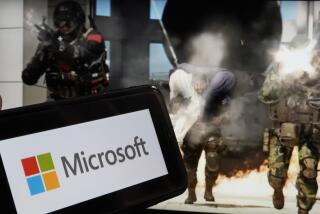Appeals Court Reverses Parts of Patent Ruling Against Microsoft
- Share via
A federal appeals court reversed a $521-million patent ruling against Microsoft Corp. on Wednesday, giving the world’s largest software maker another chance to prove that its widely used Web browser didn’t illegally copy a key piece of technology.
Microsoft hailed the 29-page decision by the U.S. Court of Appeals in Washington, D.C. -- which also ordered a new trial -- as a “clear victory” for Internet users as well as the company.
Wednesday’s ruling also upheld portions of the lower court decision.
Martin Lueck, a Minneapolis attorney representing patent holders Eolas Technologies Inc. and the University of California, predicted Microsoft ultimately would have to pay the jury award plus interest. “We believe we will prevail on this issue as we have throughout this process,” Lueck said.
The complicated case revolves around the computer coding that enables a variety of software applications to work seamlessly with Web browsers.
Eolas’ founder, cellular biologist Michael Doyle, says he invented the technology while he was working at the University of California more than a decade ago and then watched Microsoft capitalize on the breakthrough by including the features in its Internet Explorer browser. Microsoft has denied the allegations, first made in a lawsuit filed by Eolas and UC in 1999.
Doyle and the university filed for their patent in 1994, a year before Microsoft’s Internet Explorer hit the market.
Doyle and the university alleged that the browser pilfered their patented plug-in technology. A jury agreed in 2003, ordering Microsoft to pay $521 million, or $1.47 for each of the more than 350 million units of the Windows operating system that shipped from November 1998 to September 2001.
A federal judge in Chicago upheld the jury award last year and ordered Microsoft to pay $45 million in interest.
In its decision, the appeals court concluded the lower court had erred in its approach to a key issue in the case. Microsoft contends the Eolas patent is invalid because the technology had already been developed and showcased in a May 1993 demonstration by another inventor, Pei-Yuan Wei.
Microsoft’s shares fell 2 cents Wednesday to $25.26 on Nasdaq.






